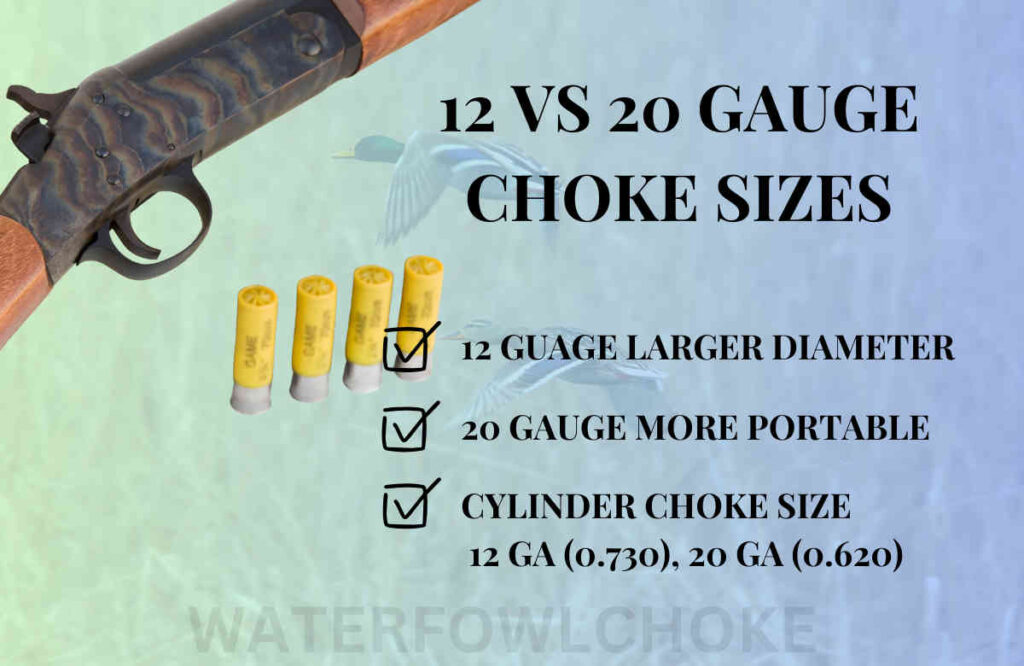Understanding the sizes of shotgun chokes is essential for any seasoned hunter. Among the myriad of questions that often arise, one of the most common is whether choke sizes are the same for 12-gauge and 20-gauge shotguns.
Choke sizes of 12-gauge and 20-gauge shotguns are not the same, and can differ by as much as a tenth of an inch. By exploring the diameters for both gauges, we can shed light on when and why you might choose one over the other, and just how large the difference in size is.

Choke Sizes for 12-Gauge Shotguns
- Cylinder (CL):
- Diameter: 0.730 inches
- Improved Cylinder (IC):
- Diameter: 0.720 inches
- Modified (M):
- Diameter: 0.710 inches
- Improved Modified (IM):
- Diameter: 0.700 inches
- Full (F):
- Diameter: 0.690 inches
Choke Sizes for 20-Gauge Shotguns
- Cylinder (CL):
- Diameter: 0.620 inches
- Improved Cylinder (IC):
- Diameter: 0.610 inches
- Modified (M):
- Diameter: 0.600 inches
- Improved Modified (IM):
- Diameter: 0.590 inches
- Full (F):
- Diameter: 0.580 inches
When comparing choke sizes between 12-gauge and 20-gauge shotguns, notable differences emerge in the diameters of each choke type. In the 12-gauge category, the Cylinder (CL) choke boasts a diameter of 0.730 inches, whereas its 20-gauge counterpart measures a slightly smaller 0.620 inches, resulting in a difference of 0.110 inches.
Similarly, the Improved Cylinder (IC) choke for 12-gauge shotguns has a diameter of 0.720 inches, contrasting with the 0.610 inches of the 20-gauge version, again showing a difference of 0.110 inches. This pattern continues with Modified (M), Improved Modified (IM), and Full (F) chokes, with consistent differences of 0.110 inches between the corresponding chokes in the two gauges.
These nuanced size variations underscore the subtle distinctions in shot patterns and performance that shooters should consider when selecting choke types for their preferred shotgun gauge.
Comparing Choke Sizes
While the basic choke types (Cylinder, Improved Cylinder, Modified, Improved Modified, and Full) are consistent across both 12-gauge and 20-gauge shotguns, the key difference lies in their diameters. The 12-gauge chokes are generally larger than their 20-gauge counterparts.
When to Choose 12-Gauge Chokes:
- Longer Range Shots:
- 12-gauge chokes, with their larger diameters, are often preferred for longer-range shots. The wider spread pattern is beneficial when targeting distant game or clay pigeons.
- Heavier Loads:
- If you’re using heavier shot loads, the larger diameter of 12-gauge chokes can provide better control over the shot pattern, enhancing accuracy.
- Versatility:
- 12-gauge shotguns are more versatile, suitable for a wide range of applications from hunting to clay shooting. The larger choke sizes accommodate various shooting scenarios.
“If you’re using heavier shot loads, the larger diameter of 12-gauge chokes can provide better control over the shot pattern, enhancing accuracy.”
When to Choose 20-Gauge Chokes:
- Closer Range Shots:
- 20-gauge chokes are ideal for closer range shots where an open shot pattern is required. This makes them well-suited for upland bird hunting and home defense.
- Reduced Recoil:
- The smaller gauge often translates to lighter shotguns and reduced recoil. This makes 20-gauge shotguns more accessible, especially for younger or smaller-framed shooters.
- Portability:
- For those who prioritize a lighter and more portable shotgun, the 20-gauge is the preferred choice. It strikes a balance between power and maneuverability.
“The smaller gauge often translates to lighter shotguns and reduced recoil.”
Bottom Line
Understanding the distinctions between 12-gauge and 20-gauge choke sizes is crucial. The choice between the two depends on factors such as desired shot pattern, shooting distance, and the specific application.
The 12-gauge is commonly a tenth of an inch larger in diameter than a similar sized 20-gauge choke. You should pick the 12-gauge for longer shots, heavier loads, and versatility. Choose the 20-gauge for closer shots, reduced recoil, and portability.
Whether you opt for the broader versatility of the 12-gauge or the more specialized applications of the 20-gauge, each has its unique advantages in the hands of a competent shooter.
Was this helpful?
Search Chokes by Gauge
Latests Posts



